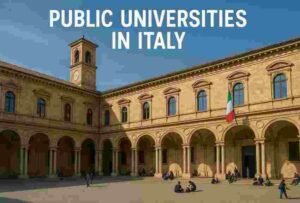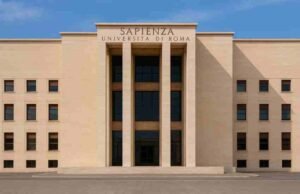Study Abroad in Italy
Italy is known for world-class universities, rich culture, and affordable education. Students enjoy historic cities and a vibrant lifestyle. Stubard helps with course selection, applications, visas, and accommodation. We make your study abroad journey in Italy smooth and easy.

How-To-Guide on Studying Abroad in Italy as an Indian Student
Italy is a culturally rich and perhaps one of the oldest education destinations in the world, as it is known to have historic universities, academic excellence, artistic heritage, and a low-cost education system. Due to its good reputation in various areas like engineering, architecture, design, medicine, business, arts and humanities, Italy has come to be the preferred study-abroad destination among Indian students.
Universities of Italy integrate centuries-old academic traditions with current research, innovation, and industry-based learning. Italy has low tuition fees, excellent government scholarships and English-speaking programs that attract thousands of foreign students annually, with a rising number of Indian students.
This guide contains all the information Indian students should be aware of about studying in Italy, including the universities, courses, admissions, tuition fees, scholarships, visas, cost of living, work opportunities, accommodation, and the student life.
Reasons Why Many Indian Students Choose to Study in Italy
Students of India prefer Italy due to its quality education, which is affordable, exposure to Europe, and global career prospects.
Significant Reasons to Study in Italy
- The oldest universities in the world are of a high international level
- Low-cost tuition fees at state universities.
- An extensive selection of Bachelor’s and Master’s taught in English.
- Scholarships funded by the government (DSU & MAECI).
- Emphasis on engineering, design, architecture, fashion, arts, and medicine.
- Scholarship chance in the European Union (EU).
- Diverse cultural, historical and artistic setting.
- Student-friendly and safe cities.
- During studies: work opportunities on a part-time basis.
- Free movement in Europe (Schengen Zone).
Italy provides Indian students with the perfect combination of education, cultural exposure, and affordable education.
Quick Facts About Italy
Feature | Details |
Capital | Rome |
Top Cities to Study | Milan, Rome, Bologna, Turin, Padua |
Popular Fields | Engineering, Design, Architecture, Business, Medicine |
Tuition Fees | ₹1–4 lakh/year (public universities) |
Living Cost | ₹70,000–1,20,000/month |
Intakes | September, February |
Scholarships | Govt. & Regional-funded |
The Education System in Italy Perfectly Suitable for Indian Students
Italy is Bologna Process aligned, and therefore, the degrees are compatible and are recognized in Europe and other parts of the world.
Study Levels:
Bachelor’s Degree (Laurea): 3 years.
Master’s Degree (Laurea Magistrale): 2 years.
Single-Cycle Degrees (Medicine, Architecture, Law): 5-6 years.
PhD / Doctorate: 3–4 years
Types of Institutions:
In Italy, students can get higher education in different types of institutions, which include:
Public Universities: Government-funded and very cheap.
Universities That Are Privately-Owned: Industry-specific and specialized.
Institutes of Higher Arts and Music (AFAM): Design, fine arts, music.
The most influential intake is the September intake, while limited programs are provided in the February intake.
Best Majors to Study Abroad in Italy as an Indian Student
Italy is admired in the world due to its engineering, architecture, design, arts, and medical education.
Popular Programs:
Engineering & Technology
Mechanical, Civil, Electrical, Automotive, Robotics, Mechatronics.
Architecture & Design
Architecture, Interior design, Urban planning, industrial design.
Business & Management
MBA, International Business, Finance, Economics, Luxury Brand Management.
Fashion & Arts
Fashion Design, Fashion Management, Fine Arts, Visual Communication.
Medicine & Life Sciences
Biotechnology, Medicine & Surgery, Biomedical Sciences, Pharmacy.
Humanities & Social Sciences
Philosophy, International Relations, History, Cultural Studies.
Indian Student Admission Requirements
For Bachelor’s:
- Completion of Class 12
- Minimum 60–70% academic score
- IELTS 5.5-6.5 (in English-taught courses)
- Entrance exam (Medicine/Architecture)
- Statement of Purpose
For Master’s:
- Recognized undergraduate degree
- IELTS 6.0–6.5
- SOP, CV, Letters of Recommendation.
- Familiarity with the academic background in the field of choice
Common Documents:
- Valid passport
- Academic transcripts
- Statement of Purpose
- Letters of Recommendation
- Results of English language tests.
- Portfolio (design/architecture courses)
Apply 6–9 months before intake.
Indian Student Visa to Italy
Indian students are required to apply to Type D (Long-term) Student Visa.
Documents Required:
- Admission letter from the university
- Evidence of accommodation in Italy
- Proof of financial means
- Academic documents
- Health insurance
- Visa application form
Visa Processing Time: 2–4 weeks
Residence Permit: It is compulsory upon arrival in Italy.
Cost of Studying in Italy
Program Level | Tuition Fees (INR/year) |
Bachelor’s | ₹1–3 lakh |
Master’s | ₹1–4 lakh |
MBA (Private) | ₹10–25 lakh |
PhD | Mostly funded |
Public universities charge depending on family earnings (ISEE) and thus, Italy is among the cheapest study spots in Europe.
Indian Students’ Living Costs in Italy
Expense | Monthly Cost (EUR) | Approx INR |
Rent | 300–600 | ₹27,000–54,000 |
Food | 150–250 | ₹13,500–22,500 |
Transport | 30–60 | ₹2,700–5,400 |
Utilities | 80–120 | ₹7,200–10,800 |
Personal | 100–200 | ₹9,000–18,000 |
The cost of cities such as Milan and Rome is higher than that of Bologna, Padua, Pisa and Turin.
Top Universities in Italy for Indian Students
The most popular and internationally reputed Italian universities are:
- University of Bologna
- Politecnico di Milano
- Sapienza University of Rome
- Politecnico di Torino
- University of Padova
- Bocconi University (Business & Economics)
Rankings:
QS Rank 2026 | University | Best Programs |
98 | Politecnico di Milano | Engineering, Design, Architecture |
128 | Sapienza University of Rome | Classics, Physics, Medicine |
138 | University of Bologna | Law, Humanities, Engineering |
233 | University of Padova | Science, Engineering |
242 | Politecnico di Torino | Automotive, Mechanical Engineering |
The degrees of Italy are recognized and well appreciated worldwide, especially in Europe.
Scholarships for Indian Students Available in Italy
Government & Regional Scholarships:
- DSU Regional Scholarships
- Italian Government MAECI Scholarships
- Invest Your Talent in Italy
University Scholarships:
- Tuition fee waivers
- Merit-based grants
- Living allowances
Benefits Include:
- Part or complete tuition waiver.
- Monthly stipend
- Complimentary or subsidized housing and food
Apply 8–12 months in advance.
Study Intakes in Italy
Intake | Months | Notes |
Fall | Sep–Oct | Main intake |
Spring | Feb | Limited programs |
Read more: Intakes in Italy for International Students 2025–2026
Work Opportunities in Italy
During Studies:
- Part-time employment of up to 20 hours/week
- Permitted post-residence permit
Post-Study Work:
- Graduates have an opportunity to obtain a post-study residence permit to find employment.
- Italy provides access to EU Blue Card and long-term jobs.
- The most demanded areas are engineering, manufacturing, design, fashion, IT, hospitality, and research.
Accommodation for Indian Students in Italy
Some of the accommodation options that students can find are:
- University dormitories
- Private student residences
- Shared apartments
- Homestays
Facilities:
- Furnished rooms
- Shared kitchens
- Laundry services
- Internet access
Apart from the abovementioned ones, there are numerous other amenities available in different accommodation properties in Italy. These amenities are high-end not only for studies but also for leisure. Some popular amenities in Italy are gyms, yoga rooms, study rooms, cinemas, games rooms, swimming pools, and a lot more. Numerous security features can also be found in student housing properties in Bologna, such as CCTV cameras, secure door entries, security teams, fire extinguishers, and more. Students get the options to live in their own companies in ensuite and non-ensuite rooms, or they can choose to live in shared rooms. There are also large studios available in Italy. The cost of accommodation is also relatively cheap and student-friendly.
Student Life in Italy
Italy provides Indian pupils with a rich Indian student life comprising historical cities, cuisine, art, architecture and festivals. Major cities have Indian restaurants, grocery businesses and student communities.
During breaks, students love going to Rome, Milan, Florence, Venice, Naples and other parts of Europe. The relaxed lifestyle, cultural diversity and warm social environment of Italy make it an easy destination.
A Few More Facts About Italy
Italy is a country in Southern Europe, which is a member of the European Union. It boasts of a good economy, a good health care system and has a modern public transport system. Italian culture, education, family and tradition are important to the society.
The main language is Italian, although English is spoken in universities and foreign workplaces. Being able to speak simple Italian is a huge bonus in everyday life and employment opportunities.
Final Note
Italy is one of the cheapest and most culturally enriching study-abroad destinations for Indian students. Through highly reputed universities around the world, low tuition, generous scholarships, and access to Europe, studying in Italy can be a life-changing academic and career experience.
For Indian students who want to receive a good education, exposure to the European world, and good value for money, Italy is unquestionably the right choice.
Cost of Living in Italy
Manage your living costs in Italy effortlessly! Plan your budget from accommodation to daily expenses with an average of €900 to €1,200 per month.

Related Content

MBBS in Italy for Indian Students 2026–27: Fees & Top Colleges

Top 10 Public Universities in Italy for International Students (2026)

University of Turin: Acceptance Rate, Admission, Courses & Scholarships (2026 Guide)

University of Milan: Acceptance Rate, Rankings, Fees, Courses & Admission Guide 2025

Sapienza University of Rome: Acceptance Rate, Rankings, Fees, and Courses

Frequently Asked Question
In Italy, education is of a high standard at minimal tuition fees with great scholarships.
Italy is relatively cheap in comparison with the UK, the US and Australia.
Students need to spend ₹1- 4 lakh per annum in government universities.
Yes, Indian students can work up to 20 hours per week.
Yes, Italy is secure and friendly to students.
Not in English-taught programs, but simple Italian is encouraged.
Some of the scholarships that can be found by Indian students are Indian students can apply for are DSU, MAECI (Italian Government), EDISU Piemonte, “Invest Your Talent in Italy,” and university-specific merit scholarships that cover tuition, housing, and living costs.
The major courses to study in Italy for Indian students are Fashion, Design, Architecture, Art, Engineering, Business, and Luxury Brand Management.
The University of Bologna in Bologna, Italy, is the oldest university in the world, which was founded in 1088.
